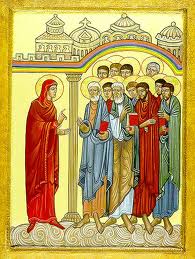 In the twenty-first century, all too many of the conversations about God are simply beyond the Church. By that I mean, talking about God to people who are outside of the Church is simply beyond the Church’s demonstrated abilities. The faithful remnant who scurry about within Christianity may talk about talking to people who have left the church, or people who have rejected the church, or even to people who have never darkened the door of a church. But when push comes to shove, very few of us are capable of engaging in serious conversation with those who live their lives beyond the Church. Rob Bell’s newly released book: “What We Talk About When We Talk About God” may not be a deep theological endeavour. It may not offer much that is new or insightful. But it does have a place in the conversations that don’t seem to be happening between church-goers and those who live beyond the Church. Indeed, Bell’s book might enable those of us who talk about talking to those outside the walls of the Church to actually begin a conversation with someone who does not share our beliefs.
In the twenty-first century, all too many of the conversations about God are simply beyond the Church. By that I mean, talking about God to people who are outside of the Church is simply beyond the Church’s demonstrated abilities. The faithful remnant who scurry about within Christianity may talk about talking to people who have left the church, or people who have rejected the church, or even to people who have never darkened the door of a church. But when push comes to shove, very few of us are capable of engaging in serious conversation with those who live their lives beyond the Church. Rob Bell’s newly released book: “What We Talk About When We Talk About God” may not be a deep theological endeavour. It may not offer much that is new or insightful. But it does have a place in the conversations that don’t seem to be happening between church-goers and those who live beyond the Church. Indeed, Bell’s book might enable those of us who talk about talking to those outside the walls of the Church to actually begin a conversation with someone who does not share our beliefs.
In my experience of speaking to those who have rejected Christianity and the Church, I have discovered that the God and the religion that so many people have walked away from the Church over, is not the God or the religion that Christianity, at its best, actually proclaims. Bell’s book articulates a Christianity that is closer to the faith most church-goers actually embrace.
Following the success and controversy surrounding his book “Love Wins”, Bell has the notoriety to generate the kind of interest that leaves the average church professional drooling in an “if only I could generate that much interest” kind of way. So there will be plenty of “tut, tuts” coming from those who will insist that it’s not a serious academic work. But don’t let their jealousy of Bell’s appeal fool you. Bell has matured some. He’s been talking to scientists and he’s been influenced by academics and he has made an attempt to talk about God in ways that the unchurched as well as the churched will find engaging. Bell’s also been talking to Peter Rollins (Irish philosopher and theologian) whose work appears to have had a refreshing influence on Bell. Indeed, Bell has chosen a title that could be considered a positive restatement of Rollins’ first book title “How (not) to Speak of God”.
Whether your a fan of Bell’s work or not, it’s difficult not to concede that Bell has mastered the art of communicating in this social media world in which we live. “What We Talk About When We Talk About God” provides an effective tool that will enable many of us to engage in conversations beyond Church. I’ve already purchased several copies and can’t wait to engage in a conversation or two with folks who are ready to engage in talk about God. Bell has given us the gift of a place from which to begin to engage in some serious God-talk.
Below you will find a promotional video created to promote the book, that will wet your appetite for the second video in which Bell lecture at Vanderbilt addresses some of what you will find in the book. Enjoy and after you read the book, use it to begin a conversation beyond Church.
Promotional Video for “What We Talk About When We Talk About God”
Rob Bell Speaking at Vanderbilt University













![peter rollins_thumb[1]](https://i0.wp.com/pastordawn.com/wp-content/uploads/2013/03/peter-rollins_thumb1.jpg?resize=244%2C220)








